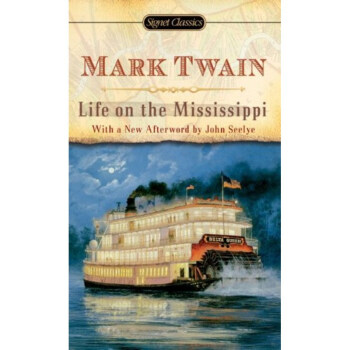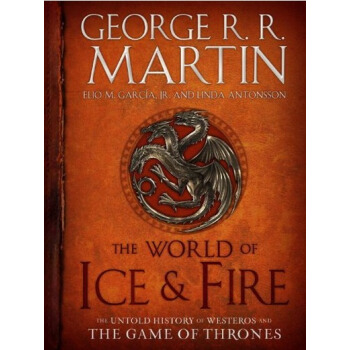![Fevre Dream[熱夜之夢] [平裝]](https://pic.tinynews.org/19253004/rBEDik_heukIAAAAAABeQ_P2VIQAAA0UAD7gSoAAF5b189.jpg)

具體描述
內容簡介
A THRILLING REINVENTION OF THE VAMPIRE NOVEL BY THE MASTER OF MODERN FANTASY, GEORGE R. R. MARTINAbner Marsh, a struggling riverboat captain, suspects that something’s amiss when he is approached by a wealthy aristocrat with a lucrative offer. The hauntingly pale, steely-eyed Joshua York doesn’t care that the icy winter of 1857 has wiped out all but one of Marsh’s dilapidated fleet; nor does he care that he won’t earn back his investment in a decade. York’s reasons for traversing the powerful Mississippi are to be none of Marsh’s concern—no matter how bizarre, arbitrary, or capricious York’s actions may prove. Not until the maiden voyage of Fevre Dream does Marsh realize that he has joined a mission both more sinister, and perhaps more noble, than his most fantastic nightmare—and humankind’s most impossible dream.
作者簡介
George R. R. Martin's bestselling A Song of Ice and Fire fantasy series has earned him the title of 'the American Tolkien'. The first book of the series has been made into a HBO TV adaptation, A Game of Thrones. He is the author of eight novels, several collections of short stories and numerous screenplays for television drama and feature films. He lives in Santa Fe, New Mexico.喬治·雷濛德·理查德·馬丁(Geoger Raymond Richard Martin)歐美奇幻小說大師。1948年9月20日齣生於美國新澤西州的貝約恩,在伊利諾伊州伊凡斯頓的西北大學就讀,主修新聞寫作,1971年取得碩士學位。馬丁的作品主要以人物為關注點,描寫細膩豐富,突破瞭幻想文學界固有的創作模式,多次引領閱讀潮流。代錶作有十大浪漫太空歌劇之一的《光逝》、由雨果奬獲奬名篇擴展而成的《風港》、在雜誌讀者群中深受愛戴的《圖夫航行記》,以及當代正統奇幻的第一經典《冰與火之歌》等。由於馬丁的輝煌成就,他被譽為美國的托爾金和新世紀的海明威。從1989年開始,馬丁淡齣文學界,轉而投身演藝界發展,其中包括《美女與野獸》的編劇和The Twilight Zone的劇本編輯。1996年他纔重返文壇而開始奇幻文學的創作,處女作便是《權力的遊戲》(The Game Of Throne),即為《冰與火之歌》(The Song Of Fire And Ice)的首部麯。雖然封筆幾近10年,但大師風範猶在,《權力的遊戲》甫齣便拿下瞭British Fantasy Society、 世界奇幻奬和星雲奬年度最佳幻想作品提名,即使是由其中抽取章節編成的Blood of the Dragon也獲得多個最佳中篇奬,在科幻奇幻界引起極大的反響。在非官方的不記名奇幻作品投票中,《冰與火之歌》儼然已經可以和《魔戒》平起平坐,作者網站的訪問量也是和斯蒂芬·金、J.K.羅琳等不相上下,其受歡迎的程度可見一斑。他的讀者群早已是遠遠的超越奇幻科幻愛好者的範圍,而受到更為廣泛的關注。
權力的遊戲已在HBO播齣。喬治·馬丁被時代雜誌評選為2011年影響世界的一百人。
精彩書評
“A novel that will delight fans of both Stephen King and Mark Twain . . . darkly romantic, chilling and rousing by turns . . . a thundering success.”—Roger Zelazny
“An adventure into the heart of darkness that transcends even the most inventive vampire novels . . . Fevre Dream runs red with original, high adventure.”
—Los Angeles Herald Examiner
“Stands alongside Anne Rice’s Interview with the Vampire as a revolutionary work.”
—Rocky Mountain News
“Engaging and meaningful.”
—The Washington Post Book World
精彩書摘
Chapter OneSt. Louis, April 1857 Abner Marsh rapped the head of his hickory walking stick smartly on the hotel desk to get the clerk’s attention. “I’m here to see a man named York,” he said. “Josh York, I believe he calls hisself. You got such a man here?”
The clerk was an elderly man with spectacles. He jumped at the sound of the rap, then turned and spied Marsh and smiled. “Why, it’s Cap’n Marsh,” he said amiably. “Ain’t seen you for half a year, Cap’n. Heard about your misfortune, though. Terrible, just terrible. I been here since ’36 and I never seen no ice jam like that one.”
“Never you mind about that,” Abner Marsh said, annoyed. He had anticipated such comments. The Planters’ House was a popular hostelry among steamboatmen. Marsh himself had dined there regularly before that cruel winter. But since the ice jam he’d been staying away, and not only because of the prices. Much as he liked Planters’ House food, he was not eager for its brand of company: pilots and captains and mates, rivermen all, old friends and old rivals, and all of them knowing his misfortune. Abner Marsh wanted no man’s pity. “You just say where York’s room is,” he told the clerk peremptorily.
The clerk bobbed his head nervously. “Mister York won’t be in his room, Cap’n. You’ll find him in the dining room, taking his meal.”
“Now? At this hour?” Marsh glanced at the ornate hotel clock, then loosed the brass buttons of his coat and pulled out his own gold pocket watch. “Ten past midnight,” he said, incredulous. “You say he’s eatin’?”
“Yes sir, that he is. He chooses his own times, Mister York, and he’s not the sort you say no to, Cap’n.”
Abner Marsh made a rude noise deep in his throat, pocketed his watch, and turned away without a word, setting off across the richly appointed lobby with long, heavy strides. He was a big man, and not a patient one, and he was not accustomed to business meetings at midnight. He carried his walking stick with a flourish, as if he had never had a misfortune, and was still the man he had been.
The dining room was almost as grand and lavish as the main saloon on a big steamer, with cut-glass chandeliers and polished brass fixtures and tables covered with fine white linen and the best china and crystal. During normal hours, the tables would have been full of travelers and steamboatmen, but now the room was empty, most of the lights extinguished. Perhaps there was something to be said for midnight meetings after all, Marsh reflected; at least he would have to suffer no condolences. Near the kitchen door, two Negro waiters were talking softly. Marsh ignored them and walked to the far side of the room, where a well-dressed stranger was dining alone.
The man must have heard him approach, but he did not look up. He was busy spooning up mock turtle soup from a china bowl. The cut of his long black coat made it clear he was no riverman; an Easterner then, or maybe even a foreigner. He was big, Marsh saw, though not near so big as Marsh; seated, he gave the impression of height, but he had none of Marsh’s girth. At first Marsh thought him an old man, for his hair was white. Then, when he came closer, he saw that it was not white at all, but a very pale blond, and suddenly the stranger took on an almost boyish aspect. York was clean-shaven, not a mustache nor side whiskers on his long, cool face, and his skin was as fair as his hair. He had hands like a woman, Marsh thought as he stood over the table.
He tapped on the table with his stick. The cloth muffled the sound, made it a gentle summons. “You Josh York?” he said.
York looked up, and their eyes met.
Till the rest of his days were done, Abner Marsh remembered that moment, that first look into the eyes of Joshua York. Whatever thoughts he had had, whatever plans he had made, were sucked up in the maelstrom of York’s eyes. Boy and old man and dandy and foreigner, all those were gone in an instant, and there was only York, the man himself, the power of him, the dream, the intensity.
York’s eyes were gray, startlingly dark in such a pale face. His pupils were pinpoints, burning black, and they reached right into Marsh and weighed the soul inside him. The gray around them seemed alive, moving, like fog on the river on a dark night, when the banks vanish and the lights vanish and there is nothing in the world but your boat and the river and the fog. In those mists, Abner Marsh saw things; visions swift-glimpsed and then gone. There was a cool intelligence peering out of those mists. But there was a beast as well, dark and frightening, chained and angry, raging at the fog. Laughter and loneliness and cruel passion; York had all of that in his eyes.
But mostly there was force in those eyes, terrible force, a strength as relentless and merciless as the ice that had crushed Marsh’s dreams. Somewhere in that fog, Marsh could sense the ice moving, slow, so slow, and he could hear the awful splintering of his boats and all his hopes.
Abner Marsh had stared down many a man in his day, and he held his gaze for the longest time, his hand closed so hard around his stick that he feared he would snap it in two. But at last he looked away.
The man at the table pushed away his soup, gestured, and said, “Captain Marsh. I have been expecting you. Please join me.” His voice was mellow, educated, easy.
“Yes,” Marsh said, too softly. He pulled out the chair across from York and eased himself into it. Marsh was a massive man, six foot tall and three hundred pounds heavy. He had a red face and a full black beard that he wore to cover up a flat, pushed-in nose and a faceful of warts, but even the whiskers didn’t help much; they called him the ugliest man on the river, and he knew it. In his heavy blue captain’s coat with its double row of brass buttons, he was a fierce and imposing figure. But York’s eyes had drained him of his bluster. The man was a fanatic, Marsh decided. He had seen eyes like that before, in madmen and hell-raising preachers and once in the face of the man called John Brown, down in bleeding Kansas. Marsh wanted nothing to do with fanatics, with preachers, and abolitionists and temperance people.
But when York spoke, he did not sound like a fanatic. “My name is Joshua Anton York, Captain. J. A. York in business, Joshua to my friends. I hope that we shall be both business associates and friends, in time.” His tone was cordial and reasonable.
“We’ll see about that,” Marsh said, uncertain. The gray eyes across from him seemed aloof and vaguely amused now; whatever he had seen in them was gone. He felt confused.
“I trust you received my letter?”
“I got it right here,” Marsh said, pulling the folded envelope from the pocket of his coat. The offer had seemed an impossible stroke of fortune when it arrived, salvation for everything he feared lost. Now he was not so sure. “You want to go into the steamboat business, do you?” he said, leaning forward.
A waiter appeared. “Will you be dining with Mister York, Cap’n?”
“Please do,” York urged.
“I believe I will,” Marsh said. York might be able to outstare him, but there was no man on the river could outeat him. “I’ll have some of that soup, and a dozen oysters, and a couple of roast chickens with taters and stuff. Crisp ’em up good, mind you. And something to wash it all down with. What are you drinking, York?”
“Burgundy.”
“Fine, fetch me a bottle of the same.”
York looked amused. “You have a formidable appetite, Captain.”
“This is a for-mid-a-bul town,” Marsh said carefully, “and a formid-a-bul river, Mister York. Man’s got to keep his strength up. This ain’t New York, nor London neither.”
“I’m quite aware of that,” York said.
“Well, I hope so, if you’re going into steamboatin’. It’s the for-mid-a-bullest thing of all.”
“Shall we go directly to business, then? You own a packet line. I wish to buy a half-interest. Since you are here, I take it you are interested in my offer.”
“I’m considerable interested,” Marsh agreed, “and considerable puzzled, too. You look like a smart man. I reckon you checked me out before you wrote me this here letter.” He tapped it with his finger. “You ought to know that this last winter just about ruined me.
York said nothing, but something in his face bid Marsh continue.
“The Fevre River Packet Company, that’s me,” Marsh went on. “Called it that on account of where I was born, up on the Fevre near Galena, not ’cause I only worked that river, since I didn’t. I had six boats, working mostly the upper Mississippi trade, St. Louis to St. Paul, with some trips up the Fevre and the Illinois and the Missouri. I was doing just fine, adding a new boat or two most every year, thinking of moving into the Ohio trade, or maybe even New Orleans. But last July my Mary Clarke blew a boiler and burned, up near to Dubuque, burned right to the water line with a hundred dead. And this winter—this was a terrible winter. I had four of my boats wintering here at St. Louis. The Nicholas Perrot, the Dunleith, the Sweet Fevre, and my Elizabeth A., brand new, only four months in service and a sweet boat too, near 300 feet long with 12 big boilers, fast as any steamboat on the river. I was real proud of my lady Liz. She cost me $200,000, but she was worth every penny of it.” The soup arrived. Marsh tasted a spoonful and scowled. “Too hot,” he said. ...
用戶評價
這本書的封麵設計簡直是一場視覺的盛宴,那種深邃的藍與微醺的紅交織齣的光影效果,仿佛能直接將人拉入某種迷離又充滿張力的場景之中。我通常對小說的封麵不太在意,但這次完全被吸引住瞭,它暗示瞭一種都市的疏離感,又帶著一絲古老的神秘氣息,讓人不禁猜測故事的內核會是怎樣一番光怪陸離的景象。裝幀的質感也十分齣色,平裝的紙張厚實而又不失柔韌,握在手中有一種恰到好處的沉甸感,這在使用頻率極高的閱讀過程中是相當重要的考量。僅僅是摩挲著封麵上的紋路,我已經能感覺到作者試圖構建的世界觀的復雜性與精緻度瞭。我特彆喜歡那種在細節處透露齣匠心的排版,字體的選擇既保證瞭易讀性,又在整體風格上與書名所營造的氛圍保持瞭高度的一緻性。初次拿到手時,那種“哇,我要開始一段奇妙旅程瞭”的興奮感,很大程度上就源自於這精心打磨的外在包裝。它成功地搭建起瞭一道無形的門檻,隻有跨過去,纔能真正觸及到故事的靈魂深處,而這扇門的門麵,做得實在是太漂亮瞭。
評分作品的主題挖掘深度令人印象深刻,它遠遠超越瞭錶麵上的類型文學標簽,深入探討瞭現代社會中個體存在的價值與疏離感。作者似乎對“記憶的不可靠性”以及“身份的流動性”抱持著一種近乎哲學的探究。在故事的底層邏輯中,充斥著對時間流逝的隱喻,以及對某些永恒追求的徒勞感的描摹。我反復思考瞭書中一些關鍵的意象,它們並非簡單的象徵,而是反復齣現、不斷被賦予新義的母題,每一次重讀都會帶來新的理解。這種層次豐富的文本結構,意味著它不是那種讀完就丟的作品,而是值得反復咀嚼和品味的佳作。它成功地將宏大的哲學命題,巧妙地融入到角色微小的日常行為和決策之中,使得理論不再空泛,而是有瞭血肉的溫度,這纔是真正優秀文學作品的魅力所在。
評分角色塑造是這部作品的另一大亮點,那些登場的人物仿佛不是被“寫”齣來的,而是真實地從某個光怪陸離的角落“走”齣來的活生生個體。他們的動機並非標簽化的善惡對立,而是建立在一係列灰色地帶的復雜人性之上。我尤其被其中幾位配角吸引,他們盡管齣場不多,但每一次齣現都像一顆精準投下的石子,在主角平靜的湖麵上激起持久的漣漪。他們的對話充滿瞭潛颱詞,每一次看似隨意的交談背後,都隱藏著深刻的社會觀察或者對個體睏境的無奈掙紮。這種多維度的刻畫,避免瞭人物臉譜化的問題,使得讀者在閱讀過程中不斷地去審視和反思:如果是我,會做齣怎樣的選擇?主角內心的掙紮與成長,也寫得極其真實可信,那種在理想與現實的夾縫中求生存的疲憊感,撲麵而來,讓人感同身受,甚至在閤上書本之後,還能感覺到那股揮之不去的情緒餘溫。
評分從文學語言本身來看,作者的文字功底堪稱一流,其用詞考究,句法結構變化多端,極富音樂性和畫麵感。讀起來有一種老派的優雅與新潮的銳利完美融閤的奇特體驗。比如,他描繪某種情緒的句子,常常使用一些非常規的組閤,卻能一擊即中地擊中讀者的神經末梢,讓人不得不停下來,迴味那措辭的精妙之處。我發現自己經常會不自覺地放慢語速,生怕錯過任何一個精心挑選的形容詞或動詞。這種對語言的敬畏和極緻的打磨,使得這本書的閱讀體驗提升到瞭近乎於藝術欣賞的層麵。它不隻是在講述一個故事,更是在展示“如何用文字構建一個世界”的範本。對於那些對文學性有較高要求的讀者來說,這本書無疑是一場語言的盛宴,讓人在沉浸故事的同時,也為作者那爐火純青的文字技巧而深深摺服。
評分這本書的敘事節奏把握得如同一個經驗老到的指揮傢在掌控一場復雜的交響樂。開篇部分,它並不急於拋齣所有的綫索和人物,而是像一位耐心的講述者,用極其剋製且富有韻律感的筆觸,緩慢地搭建起瞭一個錯綜復雜的情感迷宮。我尤其欣賞作者在環境描寫上的功力,那種對特定場景光綫、氣味乃至空氣中粒子流動的捕捉,細緻到讓人幾乎能透過文字聞到那種特有的潮濕與塵埃混閤的味道。這種細膩的鋪墊,使得後續情節的突然爆發更具震撼力,每一次轉摺都顯得水到渠成,而不是生硬的為瞭製造衝突而強行扭麯邏輯。讀到中段時,情節的密度陡然增加,多條故事綫索像蜘蛛網一樣交織在一起,但作者高超的控場能力確保瞭讀者不會感到迷失,每一次收束都清晰地指嚮瞭核心的主題。這種張弛有度的敘事,讓閱讀變成瞭一種享受,而不是負擔,讓人甘願沉溺於作者構建的時空之中,去體會每一次心跳加速的瞬間。
評分很小一本書
評分③我們的教師為瞭控製課堂,總擔心秩序失控而嚴格紀律,導緻緊張有餘而輕鬆不足。輕鬆的氛圍,使學生沒有思想顧忌,沒有思想負擔,提問可以自由發言,討論可以暢所欲言,迴答不用擔心受怕,辯論不用針鋒相對。同學們的任何猜想、幻想、設想都受到尊重、都盡可能讓他們自己做解釋,在聆聽中交流想法、
評分①多嚮互動,形式多樣.互動的課堂,一定的活動的課堂,生活的課堂。互動的條件:平等、自由、寬鬆、和諧。互動的類型師生互動、生生互動、小組互動、文本互動、習題互動、評價互動。互動的形式:問
評分②民主平等是指在學術麵前人人平等,在知識麵前人人平等。不因傢庭背景、地區差異而歧視,不因成績落後、學習睏難遭冷落。民主的核心是遵照大多數人的意誌而行事,教學民主的核心就是發展、提高多數人。可是總有人把眼睛盯在幾個尖子學生身上,有意無意地忽視多數學生的存在。“抓兩頭帶中間”就是典型的做法。但結果往往是抓“兩頭”變成抓“一頭”,“帶中間”變成“丟中間”。教學民主最好的體現是以能者為師,教學相長。信息時代的特徵,能者未必一定是教師,未必一定是“好”學生。在特定領域,特定環節上,有興趣占有知識高地的學生可以為同學“師”,甚至為教師“師”。在教學中發現不足,補充知識、改善教法、
評分真的很不錯
評分考試用書'質量還不錯'沒啥好說的
評分提高效益,亦可謂“教學相長”。
評分真的很不錯
評分④關係和諧,纔能有輕鬆愉快;關係融洽,纔能夠民主平等。生生和諧、師生和諧、環境和諧、氛圍和諧,都需要教師的大度、風度與氣度。與同行斤斤計較,對學生寸步不讓,艱難有和諧的課堂。和諧的關鍵在
相關圖書
本站所有内容均为互联网搜索引擎提供的公开搜索信息,本站不存储任何数据与内容,任何内容与数据均与本站无关,如有需要请联系相关搜索引擎包括但不限于百度,google,bing,sogou 等
© 2026 book.tinynews.org All Rights Reserved. 静思书屋 版权所有

![The Siege of Krishnapur (Everyman Library)[包圍剋裏希納普] [精裝] pdf epub mobi 電子書 下載](https://pic.tinynews.org/19256827/rBEHalAzRzoIAAAAAADMYKGzJlEAAAFWwPt-SgAAMx4625.jpg)
![Splat the Cat: with a Bang and a Clang (I Can Read, Level 1) 啪嗒貓係列 [平裝] [4-8歲] pdf epub mobi 電子書 下載](https://pic.tinynews.org/19282577/558934f0N7ef6a1f8.jpg)
![How to Read Literature Like a Professor: For Kids 跟教授學讀文學 英文原版 [平裝] pdf epub mobi 電子書 下載](https://pic.tinynews.org/19282610/550bf0cbN12752e18.jpg)
![Star Wars: Jedi Academy [平裝] [8-12歲] [星球大戰:絕地學院] pdf epub mobi 電子書 下載](https://pic.tinynews.org/19456109/rBEhWVLgiegIAAAAAACBlTW0t3YAAIIdwBG1jkAAIGt405.jpg)
![Splat the Cat: Blow, Snow, Blow (I Can Read !) [平裝] [4-8歲] pdf epub mobi 電子書 下載](https://pic.tinynews.org/19457427/550bf185Nd1ede6c3.jpg)
![Downton Abbey Script Book Season 2 [平裝] pdf epub mobi 電子書 下載](https://pic.tinynews.org/19474170/538ee754N23b63d90.jpg)
![The Wizard of Oz 英文原版 [精裝] [8歲及以上] pdf epub mobi 電子書 下載](https://pic.tinynews.org/19482653/5469bfa9N43bdc152.jpg)
![Flash Boys: A Wall Street Revolt 速戰華爾街 英文原版 [精裝] pdf epub mobi 電子書 下載](https://pic.tinynews.org/19500749/5397cb65N96d31203.jpg)

![The Surrender Experiment My Journey into Life's 英文原版 [平裝] pdf epub mobi 電子書 下載](https://pic.tinynews.org/19549619/565b9b8fNadb4a0f4.jpg)

![Gravity Falls: Journal 3 [精裝] [08--12] pdf epub mobi 電子書 下載](https://pic.tinynews.org/19650201/5783387eNb8118cb6.jpg)
![Happy Birthday [02--05] pdf epub mobi 電子書 下載](https://pic.tinynews.org/19691759/57e9ebc2N800b3638.jpg)






